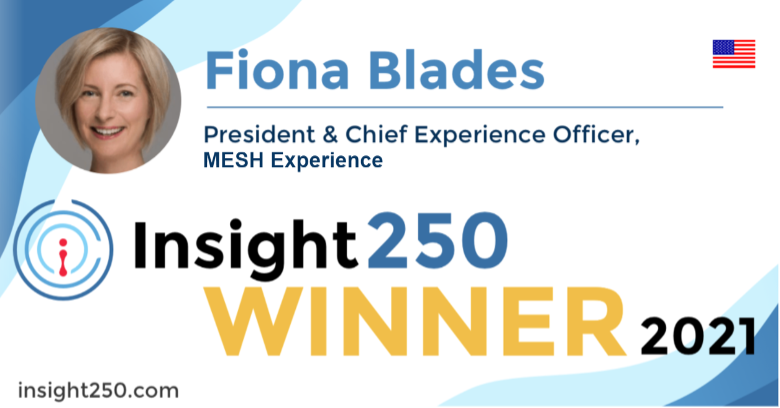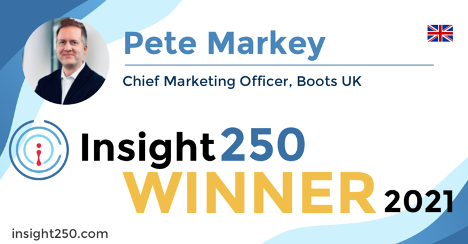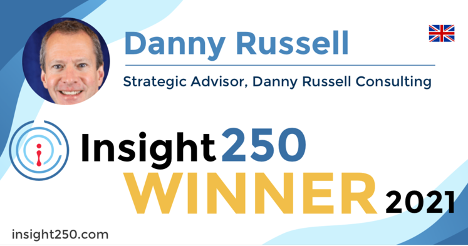



The Insight250 spotlights and celebrates 250 of the world’s premier leaders and innovators in market research, consumer insights and data-driven marketing. The inaugural list was revealed this April and created renewed excitement across the industry whilst strengthening the connectivity of the market research community.
With so many exceptional professionals named to the Insight250 it seems fitting to tap into their expertise and unique perspectives across an array of topics. This weekly series focuses on doing just that; inquiring about the expert perspectives of many of these individuals in a series of short topical features.
This edition features three exceptional experts who are focused on pushing the boundaries to courageously deliver innovation and ingenuity to the market, Fiona Blades, President and Chief Experience Officer of MESH, Danny Russell, Strategic Advisor, DRC and Pete Markey, Chief Marketing Officer for Boots.
As markets become increasingly complex, consumers become increasingly savvy and technology becomes increasingly sophisticated, it takes a courageous approach and brave execution to embrace risk taking in order to achieve competitive advantages. This feature focuses on the importance of this sort of bravery and its role in success. In the UK, our military special forces (the SAS) have the motto “Who Dares Wins” – I wondered if the Insight250 Winners would agree that the same is true in business …
Crispin: Why do you feel being bold or brave in business is important and can you give an example of when that has worked?
Fiona: “Bravery is associated with taking the unconventional route and can lead to innovation. Would Impossible Burgers exist without bravery? However, bravery is more than simply innovation. Risking your reputation, your job, your home, for what you believe in takes courage.
And innovation takes many forms. Naomi Osaka and Simone Biles have spoken up about mental health recently. This bravery permeates society and business and is transforming the way businesses are focusing on the wellness of their teams.”
Pete: “Being bold and being brave are vital if you want your business to succeed today. Cut through and differentiation are keys in markets that are increasingly becoming more challenged or commoditised. At TSB Bank, and my previous role, we launched a bold new positioning “Life Made More” with a new campaign featuring David Schwimmer from “Friends” that tapped into a core consumer insight that if people are on top of their money then they feel more confident in life. It was this insight and this launch which saw record levels of brand health and sales growth defying some of the category norms.”
Danny: “For me, bravery in business is the taking of calculated risks. It’s not reckless decision making, but it is the courage to do something different – using insight and data to challenge what has gone before or is the norm within the marketplace. Bravery is what separates true leaders from mere managers.”
Crispin: Fiona, you work globally, in your experience are different countries (cultures?) more brave in the innovations they adopt?
Fiona: “What’s brave in one country may not be in another. In 2012, John Griffiths and I set up the Ginny Valentine Badge of Courage Award. We received nominations from around the world and immediately realised that you couldn’t categorise “bravery.” How could you compare the difference between fieldworkers in a war-torn country losing their lives to get the views of their people out to the rest of the world, with a client going off-roster to bring innovation to their company?
“Some cultures may stifle brave innovations and others embrace them. My personal experience has been that this is less due to geography and more to do with the individuals we work with and the business cultures they operate within.
“MESH Experience only works with brave clients, like Pete and Danny. Others, self-select us out!”
Crispin: Is taking risks the same as bravery and how do you avoid the downsides?
Fiona: “Great question! There’s reckless risk-taking. This isn’t bravery. To avoid the downsides our industry has a massive role to play. We can be the voice of the customer providing insight into how a brave move is likely to land.
“We can make more brave leaders (and reduce the likelihood of risks going wrong)!”
Pete: “I think the two are connected as both are about stepping forward in a new direction. What should underpin both though is sound thinking, insights and strategy before taking the risk or making the bold move. To avoid the downsides, plan well and underpin your plans with really rich data and customer insights.”
Danny: “Taking non-educated risks in business is definitely not bravery! I agree with Fiona and Pete here; bravery is about using the intelligence at hand to change something – preferably for the good of the customer by decreasing their pain points. Every business knows what these are (if you don’t, go spend a day with your front line staff, they’ll give you a list within an hour!) but it’s only brave leaders that step up and then systematically commit to DOING something about it; that’s bravery.“
Crispin: Peter, Boots is undergoing a bold brand repositioning – what part did insight & innovation play?
Pete: “We tapped into an insight that as we emerge post lockdown, customers want to feel good again. They want to reconnect with loved ones and experiences they have missed over the past 18 months and that includes feeling healthy, well and beautiful. This insight led us to “Feel Good As New” a series of reinvention propositions for customers aligned to the many ways Boots as a business has reinvented itself recently. Insight and innovation underpinned, led and shaped the work. And our ongoing insight work with Fiona and MESH through the campaign continues to ensure that insight is front and center as we optimise the strategy further.”
Crispin: Danny, you’re a past Chair of the MRS – are our professional associations brave enough – what more do you feel they should do?
Danny: “We are fortunate to have some hugely committed individuals working in, and volunteering their time to these associations; personally, I’d love to see even more people step up and be brave in helping. As an industry, there is no doubt that we are more introverted than I would like – still too much focus and fascination with the method and the numbers rather than forming insights, being brave and leading change throughout the sector.”
Crispin: How are co-creation techniques changing – could we innovate further?
Fiona: “More and more people are realising how fundamentally important co-creation is. I remember approaching Professor Hugh Wilson about an ESOMAR paper Danny and I were writing “How a challenging client demanded ROI…and got it” to see how Hugh could help us prove ROI. He responded, “Fiona, suppliers never deliver ROI…it is always co-created.” Every single customer experience is co-created. When someone walks into Boots, Boots can have the best range of products in the world with the most helpful and friendly staff, but if the customer is in a hurry and frustrated, they bring that with them to the experience.
“Working with Pete at Boots, for instance, is less about the MESH team judging the marketing effectiveness and more about joining the marketing road trip as a navigator to help along the twists and turns of the journey. We operate in ecosystems, we rely on our partnerships and we could, and should, innovate further through co-creation.”
Danny: “There is nothing new in terms of co-creation but what is new is that businesses that have shunned them for years, are now being braver and opening themselves up to it. From an insight perspective, you are always looking for context. So, gaining more context (be that from consumers, competitors, your agencies, your own employees) can only be a good thing.”
Crispin: Pete, should agencies be bolder and innovate more and what should their prime focus be to deliver for Boards?
Pete: ”For me, the best agencies work with you in partnership and help move your business and your brand forward. They help you shape and deliver the right strategy and provide the right mix of support and challenge and ultimately they hold CMOs, like me, to account to deliver for the brand in the moments that matter. So, I think the best agencies should be bold and help your brand and business to innovate and be bolder and to evidence for Boards how the right strategy co-authored between agency and brand can be powerful rocket fuel for growth.”
Crispin: Danny, do great partnerships deliver innovation or does co-creation slow things down?
Danny: “Great partnerships absolutely do deliver innovation. As a client, I always told my team that the buck stopped with them – they were given responsibility to select the agencies (it was in the good old days of not having to select from a roster) and so it was their responsibility to partner with their agencies and suppliers to produce the best result. In my experience, co-creation does not slow the process down and, when used properly, produces better work and results – which is surely what we all want, right?”
Crispin: HOT TOPIC: Diversity has constantly been under the microscope this year – how should our industry respond?
Pete: “We need to ensure diversity, equality and inclusion are front and centre across all we do. That ultimately extends into the creative work we as marketers produce, but also needs to impact into areas like product development, the culture of the organisation and the environments in which you operate. Brands need to be reviewing their creative, tone of voice and imagery to ensure they reflect the rich tapestry of modern life in the UK today. They also need to be working together hand-in-hand with their agency partners to ensure the best mix of diverse talent and voices are around the table moving forwards.”
Fiona: “There has been a lot of focus on ensuring diverse groups are featured in marketing recently – which is absolutely right. However, clients should consider not just what they push out, but what people are picking up. One retail bank, doing a fabulous job in leading the way on featuring diverse groups in their advertising, has advertising that is not being picked up as much as other banks amongst an ethnically diverse audience. Maybe their media buying and algorithms are working against this inclusion? We can help clients to shine a light on areas for improvement.
“As the founder of a women-owned business I would also urge everyone to support diverse-owned businesses. Not only is there an ethical reason (the money is ending up in a more diverse space with role models to encourage others), diverse-owned businesses are known to bring innovation and are proven to deliver higher return. This 3-minute video on The Business for Supplier Diversity & Inclusion, from WEConnect International, the body that certifies women-owned businesses and introduces them to corporates, explains how the diverse-owned.”
Danny: “As with co-creation, surely we want to work with a wide range of different people, each of whom has something to add, to produce better work? Inclusion (which I prefer to the word diversity) simply means being inclusive of everyone. So, for co-creation, that means being inclusive of customers, employees, agencies and partners. With marketing per-se, why would we not want to include more people regardless of preferences (and yes, as a white, middle-aged, male, that means inclusive of everyone!). A very wise person once said to me “everyone has their own stuff going on; inclusivity is about simply being aware of this and including everyone” which makes perfect sense from a marketing perspective. Some of the biggest gaffes in this area have been made because a non-inclusive group of people were making decisions.”
TOP TIPS
Pete: “My top tip is to be the voice of the customer for your business. Be the person who is “customer obsessed” and brings the voice of the customer, vital to your business and brand, into every relevant meeting, be it in the day-to-day or the regular rhythm of an Executive or Board meeting. This is the way to help harness a culture of bravery and use these customer insights to drive true and meaningful innovation.”
Fiona: “Remember that staying true to your purpose helps you to take brave decisions when you need to.”
Danny: “I would echo what Pete said, and perhaps go even further and bring a customer into your meeting. Seriously, there is no hiding place when you are facing a customer with a real story to tell. That’s real bravery right there.”


